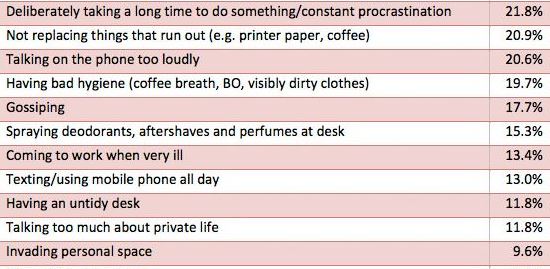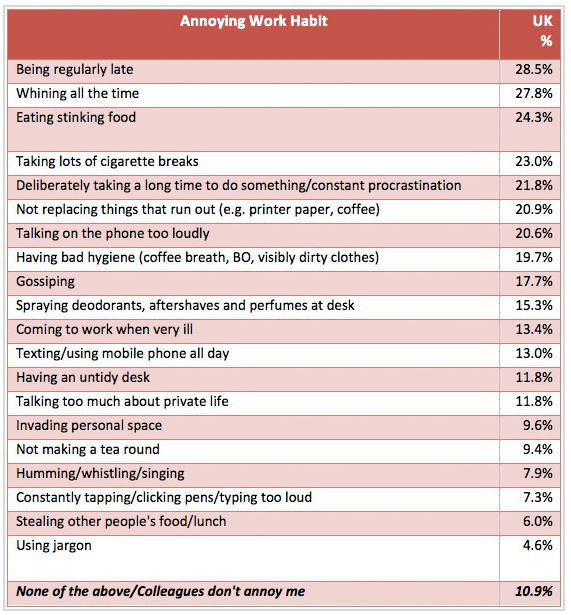What work habits and office behaviors are generally deemed the most annoying? Viking, one of the largest global suppliers of office products, recently conducted a survey to learn the most annoying office habits. While this survey was conducted in England, it looks pretty spot on for the U.S. too. Here’s a sampling of their results of the top annoyances, but click for more charts.
Here are a few more lists of other work annoyances:
- Lifehacker tackles a handful of specific situations like “the lunch thief” and “the hoverer” in their article The Worst Coworkers and Workplace Annoyances (and How to Deal with Them)
- Mashable offers a gif illustrated list of the 45 Most Annoying Office Habits
- The 15 Most Annoying Coworkers of All Time
But there is one other possibility: it might not be your colleagues, it might be you.
In the Wall St Journal, Daniel R. Ames and Abbie S. Wazlawek say that most people are blissfully unaware of how they come across in the office. In How to Tell if You’re a Jerk at Work, they discuss the gap between how we see ourselves vs how other see us.
Knowing your own strengths and limitations, and how others see you and your behavior, has been linked to a range of positive outcomes. But when it comes to understanding how others see us, many of us are in the dark.
One example comes from our own research where we’ve asked negotiators at the end of a deal-making session to classify themselves as having been underassertive, overassertive or appropriately assertive. We also asked them the same question about their counterparts. When we compare how people categorize themselves with how their counterparts categorize them, the correspondence is disturbingly low—not much better than flipping a coin.
They suggest ways to raise our self awareness by collecting feedback from peers and colleagues.
At FastCompany, Beverly Kaye and Sharon Jordan-Evans offer more self-assessment thoughts and ideas in Are You the Jerk at Work?
Whether the fault lies in our colleagues or ourselves, the reality is that living and working among others means that petty annoyances and conflicts will exist. If you find your colleagues highly annoying, moe so than usual, it may be a sign that you need a vacation. If you take a vacation and that doesn’t do the trick, you may need to enhance your skills at relating to and negotiating with other people, or you may need stress counseling or anger management. Why not call your EAP to talk it over?


